Oxford Latin American Graduate Network (OLAGN)
Oxford Latin American Graduate Network
The Oxford Latin American Graduate Network (OLAGN), affiliated with the Latin American Centre, aims to strengthen the community of students working on Latin America in Oxford and to encourage genuine interdisciplinary dialogue and mutual support. Graduate students across all social sciences and humanities departments at the University of Oxford interested in research on Latin America are welcome to join the Network.
The Network was founded in 2019 with the inauguration of a termly seminar series, in which OLAGN members present their research and receive feedback from fellow students and guest academics. Today, alongside the seminar series, OLAGN also conducts regular film screenings to discuss cinematic works produced in Latin America. These initiatives have proven to be an excellent occasion for multidisciplinary exchange, critical thinking and networking.
If you are interested in hearing more about the Network’s news and events, you can send a blank email to latin_american_grad_network-subscribe@maillist.ox.ac.uk to subscribe.
You may also want to join us on Facebook and Twitter/X.
Doctoral Studies at Oxford
The Oxford School of Global and Area Studies (OSGA) offers a DPhil in Area Studies for students that aim to explore a broad range of area-specific issues in Latin America (and other regions of the world). The School’s DPhil (the name given to the PhD degree at the University of Oxford) is a full-time three-year programme of doctoral study, offering the opportunity to undertake a project dedicated to researching a specific country, a particular region, or else to examining more than one country or region in a comparative context, using social science approaches whilst also generating theories and propositions that are of value across regions. More information about the DPhil in Area Studies may be consulted here.
Moreover, students can study for doctorates with a Latin American theme or focus under the aegis of other disciplines in departments including History, Politics & International Relations, Economics, Sociology, Modern Languages (Literature), Development Studies and Anthropology.
Please see the Theses and Dissertations in Latin American Studies document for a list of past Oxford theses submitted on Latin American topics. The Oxford University Research Archive (ORA) is the home of Oxford digital theses.
OLAGN's Graduate Seminars
Every term the Network organizes seminars, where students that research any topic related to the region have the chance to present and receive constructive feedback from colleagues, professors, and guest academics.
The seminars are a great opportunity for second year MPhils who are working on their thesis and for DPhils who are preparing for their transfer of status, confirmation or final viva. It is also a very helpful occasion when preparing a paper for a conference or journal submission. It offers a challenging yet flexible space for conversation and discussion, where graduate students can meet peers from other departments with a common interest in Latin America. Please feel free to contact the Organising Committee if you would like to present.
2023-24
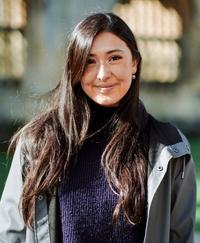
Anneli Aliaga
Having completed an MPhil in Latin American Studies at the University of Cambridge, I transferred to the University of Oxford to start a DPhil in Spanish. I’m a Bolivian/British second-year DPhil student in the Faculty of Medieval and Modern Languages and I am an awardee of the Magdalen College Graduate Scholarship. My doctoral research understands cinema authored by Indigenous peoples as the epitome of both an epistemic and cinematic process of decolonisation. I plan to build on the existing scholarship on Indigenous film in Bolivia and Peru by investigating the political and ecological significance behind the rise of self-representative Indigenous filmmaking in the two nations. My doctoral project will be carried out based on an array of low-budget, feature-length and short, fiction films authored by Quechua, Aymara, Ayoreo, Ticuna, and Mojeño filmmakers and communities. These films provide an original cinematic commentary on socio-political, racial, cultural, ecological, and territorial struggles in the Indigenous Bolivian and Peruvian imaginary.

Belén Caparros
Belén (she/her) is a Ph.D. candidate in Latin American Literature and Cultural Studies at the Universidad de San Andrés, Buenos Aires. She has a degree in Cinematography from the Universidad del Cine and a Master in Cultural Management from the Universidad de San Andrés. Her research examines contemporary Latin American horror and fantasy literature and film from a gender perspective, focusing on its relations with feminist movements and the struggles of sexual minorities of the 21st century in Argentina and other countries in the region. Belén is also a Multimedia Designer and an Assistant Professor in Modern and Comparative Literature. She has previously worked as a producer for independent audiovisual projects and is currently a visiting student at the University of Oxford as part of her doctoral research activities.
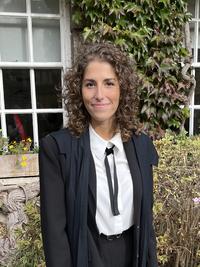
Manuela Crivelli (she/her) is a MPhil student in the Department of Modern Languages, focusing on contemporary fiction in the Río de la Plata. Her research interests include the increasing emergence of non-realist literature (e.g. sci-fi, horror, weird fiction), engaged in the representation and discussion of issues concerning climate change, the Anthropocene and the relationship between humans and the environment. Manuela spends her free time outdoors - either on a run or a hike - or in the kitchen, experimenting with new recipes from all around the world.
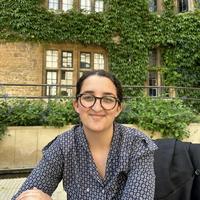
Georgie Fooks
Georgie (she/her) is a DPhil candidate in Modern Languages, working on Latin American literature and visual culture. Her research explores the idea of a translational poetics, researching two Argentine poets - Alejandra Pizarnik and Susana Thénon - who move between languages and images in order to create expanded networks of expression. Her research interests include queer and postcolonial literature in Latin America, translation, and the visual arts. In her free time, she enjoys vegetarian cooking, art museums, and being by the sea.
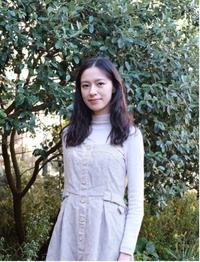
Lingchen Huang
Lingchen (she/her) is a DPhil candidate in Modern Languages, working on modern Brazilian literature and literary theories. Her current research explores the conception of subjectivity, focusing on Clarice Lispector’s novels, affect theory and the nonhuman turn. Her other research interests include contemporary Lusophone African literature, postcolonial studies, gender and sexuality, and continental philosophy. Outside research, she enjoys playing the piano and literary translation.
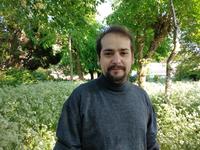
José Parra Zeltzer
José (he/him) is a DPhil student in Modern Languages, currently working with contemporary Chilean fiction cinema. His research questions the different aspects of realism in this national production over the last 10 years, with a specific preoccupation with the depiction of marginalized communities and spaces. His main areas of interest are film realism, the politics of representation and the depiction of space and bodies in digital cinema. In his free time, José likes reading, playing board games, and watching movies, and tries, with little success, practicing sports.
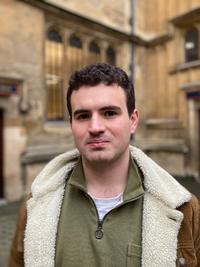
Benjamin Rymer
Ben (he/him) is a second-year DPhil student studying disease in the Wars of Independence in Spanish America. He is interested in tracing what effect diseases such as yellow fever, malaria, and altitude sickness had on the course of the wars, together with how ideas about disease and the environment informed discourses around colonial difference and imperial collapse. Ben has previously researched British business and investment in Spanish America in the early nineteenth century. When not working, Ben sings in choirs, and enjoys exploring the city and countryside on bike and on foot.



